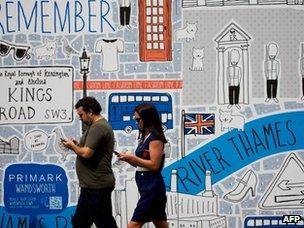4G - peace in our time?
- Published
- comments

It's a crucial meeting at which Britain's hi-tech future could be decided. Later on Tuesday, the new Culture Secretary Maria Miller presides over peace talks between the chief executives of the major mobile phone operators and Ofcom's boss Ed Richards.
The issue at stake - can the 4G auction be accelerated enough to convince O2 and Vodafone not to go to war with Ofcom over what they see as favouritism towards their rival Everything Everywhere?
Having seen a letter written by Mr Richards to the culture secretary outlining the shape of a deal, I'd be surprised if peace does not break out.
But first a quick reminder of how we got here. Back in August, Ofcom announced that it would allow Everything Everywhere - now EE - to use its existing 1,800Mhz spectrum to start its 4G service early. Its rivals, without enough of that spectrum to adopt a similar strategy, threatened legal action to challenge Ofcom's ruling and prevent EE from launching 4G.
Then, in one of his last acts as Culture Secretary, Jeremy Hunt negotiated a four-week ceasefire - EE would agree to hold off announcing a 4G launch date, its rivals would keep their lawyers on the leash. Now that ceasefire is over and Tuesday's meeting should decide what happens next.
What O2 and Vodafone wanted was reassurance that EE's window of exclusivity would be shortened by having the whole 4G auction accelerated. Ofcom's letter - which has been copied to all the operators - asserts that considerable progress has been made.
The January date of the auction itself can only be brought forward by a couple of weeks, but much more has been done, says Ofcom, about the process of clearing the spectrum for use by its new owners. With analogue television and air traffic control currently using some of the airwaves, it was expected to take until the end of 2013 for this job to be completed. Now, says Ofcom, the hope is that it can be completed in the late spring, so that new 4G services could start rolling out to many parts of the UK in May or June 2013.
The other issue for O2 and Vodafone has been that EE might try to delay the process. A new body Mitco, financed by all the operators, has been created to ensure that 4G signals do not interfere with digital television. The fear was that it would be in EE's interest to make sure this work did not proceed too rapidly. But on this point too, Ofcom has been eager to reassure the government that Mitco will do its job as rapidly as possible.
All in all, Ofcom believes that EE's period of being the only 4G game in town will shrink from as much as 18 months to as little as six months. O2 in particular will want to see the fine print before telling its masters at Telefonica that this deal is acceptable. But it seems likely that they will sign up rather than risk being seen as the company which delayed the arrival of a vital technology for the UK.
And if it does all work out, Ofcom will be entitled to feel just a little smug. By taking a risk with its EE ruling, it will have forced the whole mobile industry to focus on a faster transition to 4G.